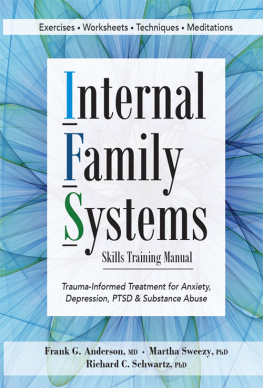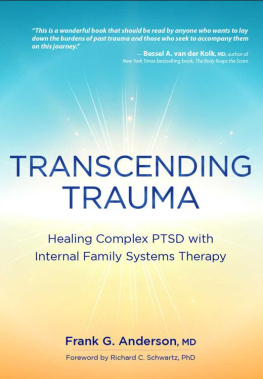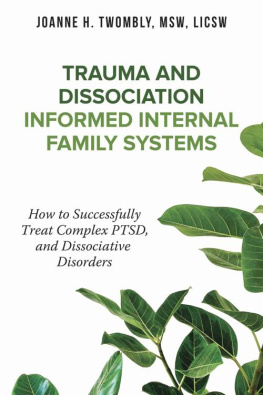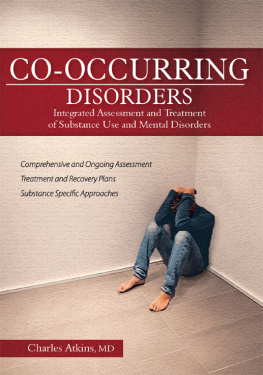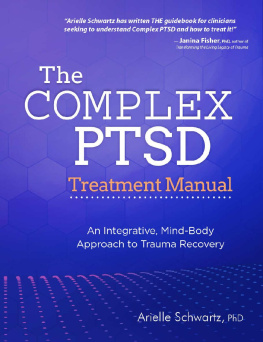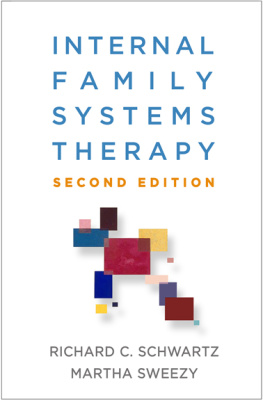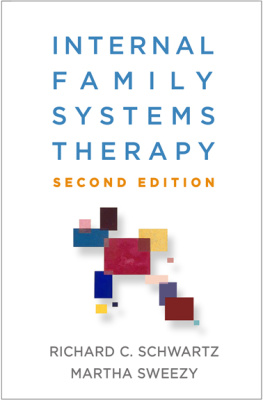Exercises Worksheets Techniques Meditations
I nternal F amily S ystems
Skills Training Manual
Trauma-Informed Treatment for Anxiety,
Depression, PTSD & Substance Abuse
Frank G. Anderson, MD Martha Sweezy, PhD
Richard C. Schwartz, PhD
Copyright 2017 Frank G. Anderson, Martha Sweezy, Richard C. Schwartz
Published by
PESI Publishing & Media
PESI, Inc.
3839 White Ave
Eau Claire, WI 54703
Cover Design: Amy Rubenzer
Layout: Amy Rubenzer & Bookmasters
Editing: Marietta Whittlesey
Proudly printed in the United States of America
ISBN: 9781683730873
All rights reserved
Dedication
I dedicate this book to my husband, my children and my parents.
First and foremost, to Michael for your ongoing and unwavering support in all my life endeavors. Your encouragement to embody and express my true self has been one of the greatest gifts of my life. To my children Logan and Austin, by far my greatest teachers. We were brought together to learn from each other and grow together. You have changed me in ways I could never have imagined. I love you dearly and thank you for choosing me to be a mentor on your journey.
To my parents: Dad, for becoming my cheerleader and biggest fan; Mom, for telling my younger self that I could do anything I wanted to in my life. Thank you both for the sacrifices you have made and the love you have always sent my way.
With love and gratitude,
Frank Anderson
I dedicate this book to my dear friend, Pat Gercik, whose loving Self-energy puts the P into present, persistent, and playful.
Martha Sweezy
I dedicate this book to the late Regina Goulding, a fearless collaborator in the exploration of the traumatized inner world.
Dick Schwartz
The authors also thank Linda Jackson and Claire Zelasko for their kindness, patience, help and enthusiasm throughout this process. We also thank each other for the same.
Table of Contents
About the Authors
Frank G. Anderson, MD
Dr. Frank Anderson completed his residency in psychiatry at Harvard Medical School and specializes in understanding and treating the effects of psychic pain and trauma. He is committed to promoting compassion, hope, healing and non-violence in a troubled world.
Dr. Anderson travels around the world as a proponent and instructor of Internal Family Systems (IFS)an evidence-based treatment that offers an accelerated path to self-awareness and healing of emotional wounds. Unique as both a psychiatrist and psychotherapist, he specializes in the treatment of trauma and dissociation in his private practice and is passionate about teaching brain-based psychotherapy, integrating current neuroscience knowledge with the IFS model of therapy. From serving as the executive director of the Foundation for Self Leadership, to conducting research and collaborating with Pixar, he also attended the Spirit of Humanity Conference in Iceland and treated survivors of the 9/11 attacks in New York City. He remains active and engaged in his profession.
Martha Sweezy, PhD
Martha Sweezy, PhD, is an assistant professor at Harvard Medical School, a program consultant and supervisor at Cambridge Health Alliance, and the former assistant director and director of training for the dialectical behavioral therapy (DBT) program at the Cambridge Health Alliance. She is the author of two articles on IFS, Treating Trauma After Dialectical Behavioral Therapy in the Journal of Psychotherapy Integration and The Teenagers Confession: Regulating Shame in Internal Family Systems Therapy in the American Journal of Psychotherapy, and co-editor/co-author of the books Internal Family Systems Therapy: New Dimensions, and Innovations and Elaborations in Internal Family Systems Therapy, as well as co-author of the book Intimacy from the Inside Out: Courage and Compassion in Couple Therapy. She has a therapy and consultation practice in Northampton, Massachusetts.
Richard C. Schwartz, PhD
Dr. Schwartz developed Internal Family Systems in response to clients descriptions of experiencing various parts many extreme within themselves. He noticed that when these parts felt safe and had their concerns addressed, they were less disruptive and would accede to the wise leadership of what Dr. Schwartz came to call the Self. In developing IFS, he recognized that, as in systemic family theory, parts take on characteristic roles that help define the inner world of the clients. The coordinating Self, which embodies qualities of confidence, openness, and compassion, acts as a center around which the various parts constellate. Because IFS locates the source of healing within the client, the therapist is freed to focus on guiding the clients access to his or her true Self and supporting the client in harnessing its wisdom. This approach makes IFS a non-pathologizing, hopeful framework within which to practice psychotherapy.
In 2000, he founded The Center for Self Leadership in Oak Park, Illinois. Dr. Schwartz is a featured speaker for many national psychotherapy organizations and a fellow of the American Association for Marriage and Family Therapy, and he serves on the editorial boards of four professional journals. He has published four books and over 50 articles about IFS. His books include Internal Family Systems Therapy, Introduction to the Internal Family Systems Model, and co-author of Family Therapy: Concepts and Methods, The Mosaic Mind, and Metaframeworks. Dr. Schwartz lisves and practices in Brookline, MA and is on the faculty of the Department of Psychiatry, Harvard School of Medicine.
 | Introduction to Internal Family Systems (IFS) |
Richard C. Schwartz, who has a Ph.D. in marital and family therapy, and is one of the authors of this manual, developed internal family systems therapy (IFS) in the 1980s while treating eating disordered (ED) adolescents who routinely spoke about internal conversations with what they called different parts. Following their vernacular lead, he referred to their subpersonalities as parts. While exploring options and encouraging the clients to interact with their ED parts the way members of a family interact, Schwartz learned that he and the client could persuade an extreme ED part to permit the client some mental separation from its distorted perspective, whereupon the client would spontaneously become mindful (nonjudgmental and curious) toward the part.
This kindly ultimately compassionate relational stance between client and parts proved crucial to healing and became the linchpin of IFS therapy. Weve all had moments of clarity and balance when the incessant chatter inside our head ceases, we feel calm and spacious, as if our mind, heart and soul had brightened and expanded. At other times, we feel a wave of joyful connection with others that washes away irritation, distrust, and boredom. Schwartz observed that healing just happens when therapist and client achieve a critical mass of this phenomenon, which he dubbed the
Next page
